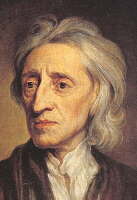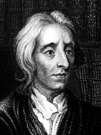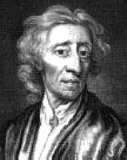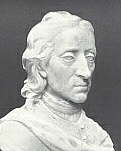Locke (original) (raw)

John Locke
(1632-1704)
Life and Works
. . Empiricism
. . Qualities
. . Liberty
. . Substance
. . Identity
. . Words
. . Knowledge
. . Property
. . Government
Bibliography
Internet Sources
Although he completed a philosophical education at Oxford, John Locke declined the offer of a permanent academic position in order to avoid committing himself to a religious order. Having also studied medicine, he served for many years as private physician and secretary to Anthony Ashley Cooper, the first Earl of Shaftesbury and one of the Lord Proprietors of the Carolina Colonies. Locke's involvement with this controversial political figure led to a period of self-imposed exile in Holland during the 1680s, but after the Glorious Revolution of 1688 he held several minor governmental offices. A friend ofIsaac Newton andRobert Boyle, Locke was also an early member of the Royal Society. He studied and wrote on philosophical, scientific, and political matters throughout his life, in a voluminous correspondence andample journals, but the public works for which he is best known were published in a single, sudden burst.
The fundamental principles of Locke's philosophy are presented inAn Essay Concerning Human Understanding (1690), the culmination of twenty years of reflection on the origins of human knowledge. According to Locke, what we know is always properly understood asthe relation between ideas, and he devoted much of the Essay to an extended argument that all of our ideas—simple or complex—are ultimatelyderived from experience. The consequence of thisempiricist approach is that the knowledge of which we are capable isseverely limited in its scope and certainty. Our knowledge of materialsubstances, for example, depends heavily on the secondary qualities by reference to which we name them, while their real inner natures derive from theprimary qualities of their insensible parts.
Our knowledge of materialsubstances, for example, depends heavily on the secondary qualities by reference to which we name them, while their real inner natures derive from theprimary qualities of their insensible parts.
Nevertheless, Locke held that we have no grounds for complaint about the limitations of our knowledge, since a proper application of our cognitive capacities is enough toguide our action in the practical conduct of life. The Essay brought great fame, and Locke spent much of the rest of his life responding to admirers and critics by making revisions in later editions of the book, including detailed accounts of humanvolition and moral freedom, thepersonal identity on which our responsibility as moral agents depends, and the dangers of religious enthusiasm. One additional section that was never included in the Essay itself isOf the Conduct of the Understanding, a practical guide to the achievement of useful beliefs about the world. The bachelor philosopher's notions about childrearing appeared inSome Thoughts concerning Education (1693).
The bachelor philosopher's notions about childrearing appeared inSome Thoughts concerning Education (1693).
By contrast, Locke chose to avoid controversy by publishing his political writings anonymously. With the Two Treatises of Civil Government (1690) Locke established himself as a political theorist of the highest order. The First Treatise is a detailed refutation of the (now-forgotten) monarchist theories of Robert Filmer, but theSecond Treatise of Government offers a systematic account of the foundations of political obligation. On Locke's view, all rights begin in theindividual property interest created by an investment of labor. The social structure or commonwealth, then, depends for its formation and maintenance on the express consent of those who are governed by its political powers. Majority rule thus becomes the cornerstone of all political order, and dissatisfied citizens reserve a lastingright to revolution. Similarly, Locke'sLetter Concerning Toleration (1689) argued for a broad (though not limitless) acceptance of alternative religious convictions.
Recommended Reading:
Primary sources:
- John Locke, Works (Clarendon, 1975- )
- John Locke, An Essay Concerning Human Understanding, ed. by Peter H. Nidditch (Clarendon, 1989)
- John Locke, Some Thoughts Concerning Education and of the Conduct of the Understanding, ed. by Ruth W. Grant and Nathan Tarcov (Hackett, 1996)
- John Locke, Two Treatises of Government, ed. by Peter Laslett (Cambridge, 1988)
- John Locke, A Letter Concerning Toleration (Prometheus Books, 1990)
Secondary sources:
- Richard I. Aaron, John Locke (Clarendon, 1971)
- Nicholas Jolley, Locke: His Philosophical Thought (Oxford, 1999)
- John W. Yolton, Locke and the Way of Ideas (St. Augustine, 1993)
- The Cambridge Companion to Locke, ed. by Vere Chappell (Cambridge, 1994)
- Locke on Human Understanding, ed. by I. C. Tiption (Oxford, 1977)
- Locke's Philosophy: Content and Context, ed. by G. A. J. Rogers (Oxford, 1997)
- Michael Ayers, Locke: Epistemology and Ontology (Routledge, 1994)
- John L. Mackie, Problems from Locke (Oxford, 1976)
- Michael Ayers, Locke (Routledge, 1999)
- John Locke: An Essay Concerning Human Understanding in Focus, ed. by Gary Fuller, Robert Stecker, and John P. Wright (Routledge, 2000)
- E. J. Lowe, Routledge Philosophy Guidebook to Locke on Human Understanding (Routledge, 1995)
- David L. Thomas, Locke on Government (Routledge, 1995)
- David Lloyd Thomas, Routledge Philosophy Guidebook to Locke on Government (Routledge, 1995)
- Jeremy Waldron , God, Locke and Equality: Christian Foundations of Locke's Political Thought (Cambridge, 2002)
- Ross Harrison, Hobbes, Locke, and Confusion's Masterpiece: An Examination of Seventeenth Century Philosophy (Cambridge, 2002)
Additional on-line information about Locke includes:
- A Guide to John Locke's Essay concerning Human Understanding.
- articles in The Stanford Encyclopedia of Philosophy on:
- Locke by William Uzgalis
- Locke's moral philosophy by Patricia Sheridan
- Locke's philosophy of science by Hylane Kochiras
- Locke's political thought by Alex Tuckness
- A thorough article in The Internet Encyclopedia of Philosophy.
- The John Locke Bibliography from John C. Attig.
- The full article available at Encyclopædia Brittanica Online.
- The thorough collection of resources at EpistemeLinks.com.
- A section on Locke from Alfred Weber's history of philosophy.
- Discussion of Locke's critique of innatism by Syliane Charles.